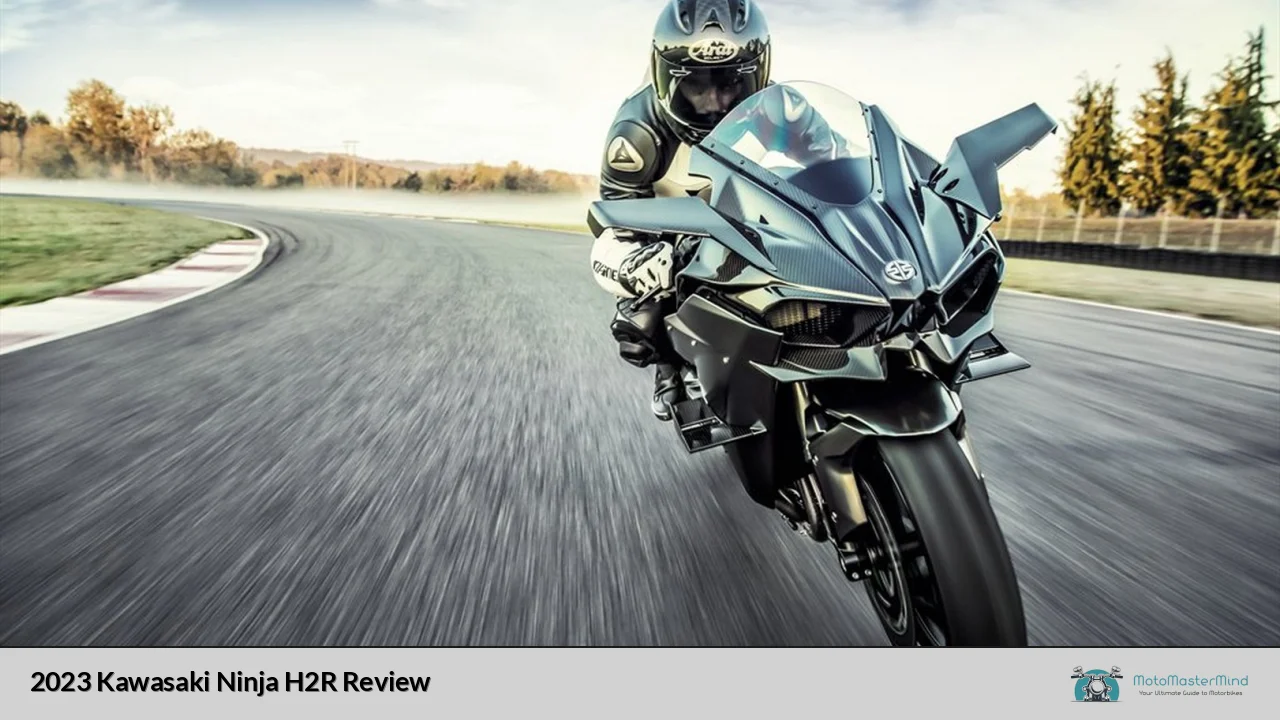The 2023 iteration of the Kawasaki Ninja H2R manifests as a marvel in motorbikes, challenging the constraints of two-wheeled engineering. The essence of its creation is encapsulated in its aspiration for unparalleled speed, achieved through a supercharged engine amalgamated with the pinnacle of technological innovation. It’s a concoction of elements curated explicitly for conquering race tracks, a characteristic evident in every facet of its hyper sport configuration.
Kawasaki Ninja H2R Aerodynamic Mastery

In the blueprint of the Ninja H2R, the emphasis is predominantly laid on aerodynamics. Every element of its structure collaborates to diminish drag and amplify downforce, enabling it to traverse the air with optimal finesse. It is endowed with a trellis frame of minimal weight, constructed with high-tensile steel to ensure both robustness and solidity. This lightweight frame aligns with the carbon fiber wings and fairings to reduce weight and enhance aerodynamic proficiency.
Kawasaki Ninja H2R Technological Prowess
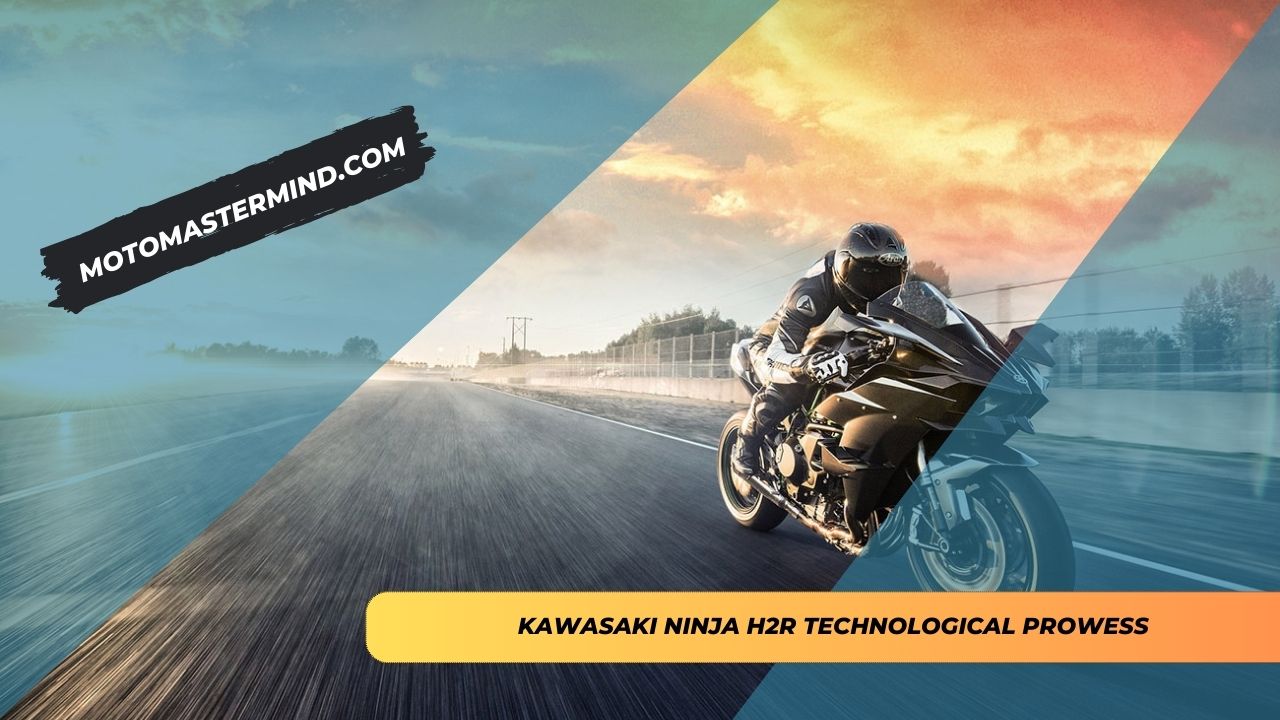
In this 2023 model, the Kawasaki Intelligent anti-lock Brake System (KIBS) is a prominent feature. This system, embedded with sensors, scrutinizes wheel speed and the force applied to the brakes, modifying brake pressure meticulously to avoid wheel lock-up and ensure impeccable stability. It’s a pivotal inclusion that curtails the likelihood of mishaps and assures the riders to exploit the bike’s potential to the extremity, cementing their faith in the machine.
Kawasaki Ninja H2R Pricing and Worth
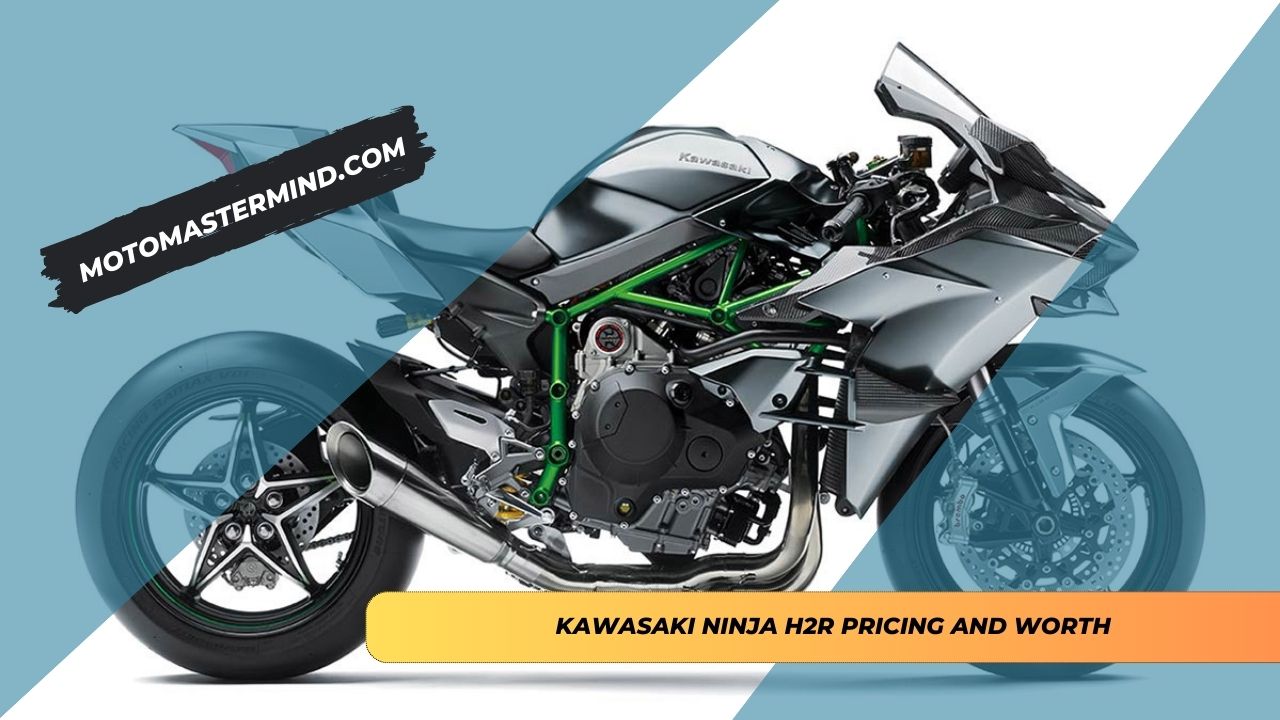
Concerning economic considerations, the Ninja H2R doesn’t conform to the conventional. Boasting a commencement price approximating $57,500, as per the official representations by Kawasaki, it emerges as one of the premium bikes in the commercial sphere. Acquiring this mechanical beast might necessitate a substantial financial investment. Nevertheless, for fans with a penchant for supreme-track experiences, the investment in the Ninja H2R justifies every cent expended.
So, concluding this Kawasaki Ninja H2R Review, one can discern that the 2023 model is not merely a bike; it’s a revolutionary symbol in the motorcycle domain. It embodies speed, precision, and technological sophistication, destined solely to traverse the tracks with an unmatched velocity. Its sophisticated design, augmented by state-of-the-art features, makes it an unparalleled choice for those who seek the zenith in racing machinery, even if it entails a hefty price tag. For the devoted and the passionate, it’s a priceless gem, reflecting the epitome of motorcycle evolution.
2023 Kawasaki Ninja H2R Key Specs
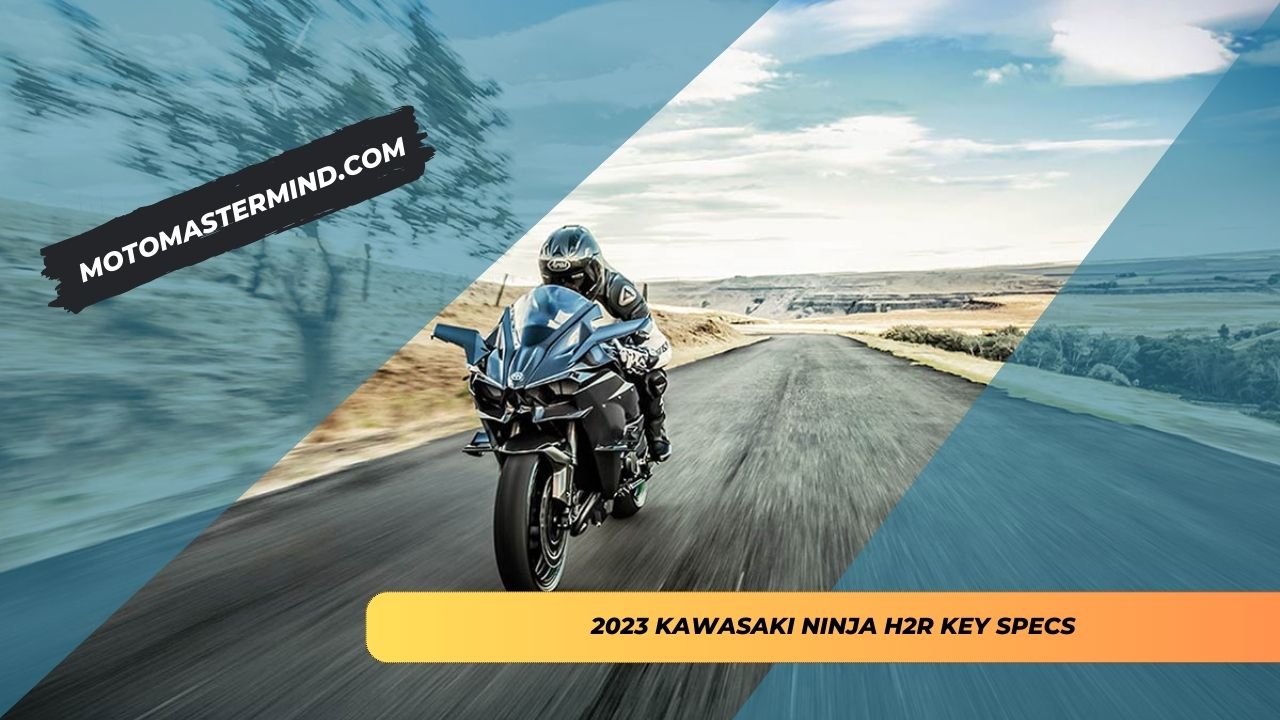
| Specification | Detail |
|---|---|
| Make | Kawasaki |
| Model Year | 2023 |
| Type | Closed-Course Hypersport |
| Color | Mirror Coated Matte Spark Black |
| MSRP Price | $57,500 |
| Warranty | N/A |
| Warranty Plus | N/A |
| Engine | 998cc, 4-stroke |
| Power | 310 HP |
| Mileage | 35.3 mpg (15 km/l) |
| Transmission | 6-speed |
| Fuel Tank Capacity | 4.5 gal (17 l) |
| Seat Height | 32.7 in. (831 mm) |
| Curb Weight | 476.3 lb. (216 kg) |
2023 Kawasaki Ninja H2R Specifications
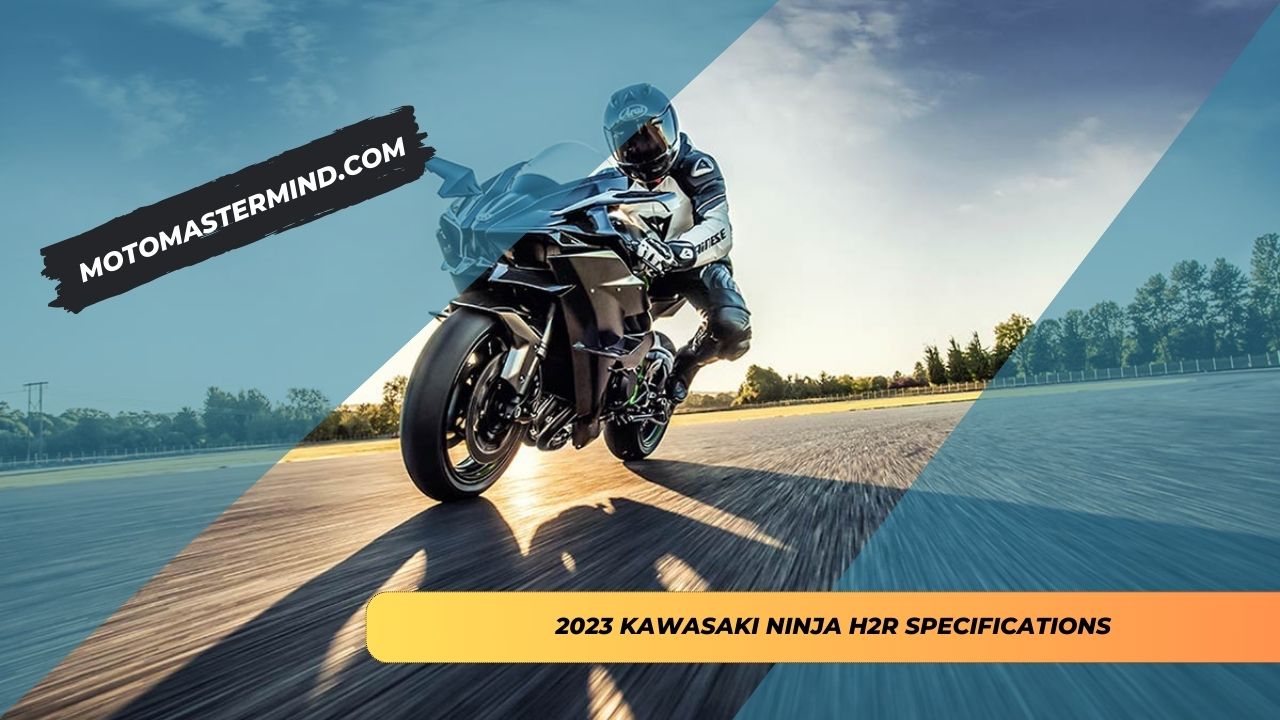
| Specification | Detail |
|---|---|
| Model | 2023 Kawasaki Ninja H2R |
| Engine Type | Liquid-cooled, 4-stroke, In-Line Four, DOHC, 16-valve |
| Engine Size | 998cc |
| Power | 310 horsepower |
| Torque | 121.5 lb-ft (164.7 Nm) @ 12,500 rpm |
| Bore x Stroke | 76.0 x 55.0mm |
| Compression Ratio | 8.3:1 |
| Fuel System | DFI® with 50mm throttle bodies (4) with dual injection; Supercharger |
| Ignition | Digital |
| Transmission | 6-speed, return, dog-ring |
| Final Drive | Sealed chain |
| Frame Type | Trellis, high-tensile steel, with swingarm mounting plate |
| Front Suspension | 43mm inverted fork with adjustable rebound and compression damping |
| Rear Suspension | Uni-Trak®, Öhlins TTX36 gas charged shock with piggyback reservoir |
| Front Brakes | Dual radial-mount, opposed 4-piston Brembo Stylema® calipers |
| Rear Brakes | 190/65 ZR17 V01R slick |
| Front Tires | 120/60 ZR17 V01F slick |
| Rear Tires | 190/65 ZR17 V01R slick |
| Rake/Trail | 25.1°/4.3 in |
| Dimensions (L x W x H) | 81.5 in. x 33.5 in. x 45.7 in. (2070 mm x 851 mm x 1161 mm) |
| Ground Clearance | 5.1 in. (129.5 mm) |
| Seat Height | 32.7 in. (831 mm) |
| Wheelbase | 57.1 in. (1450 mm) |
| Curb Weight | 476.3 lb. (216 kg) |
| Fuel Capacity | 4.5 gal (17 l) |
Competitor Comparison
| Model | Price | Engine | Top Speed |
|---|---|---|---|
| 2023 Ducati Panigale V4 R | £40,000 | 998cc | 200 mph |
| 2023 Aprilia RSV4 | £17,150 | 1099cc | 186 mph |
| 2023 BMW S 1000 RR | $17,895 | 999cc | 186 mph |
Diving Into the 2023 Kawasaki Ninja H2R Features

Economical Riding Marker
Incorporating the high-precision electronic control devoted to engine management is pivotal in Kawasaki models, ensuring remarkable fuel efficiency. Nevertheless, throttle modulation extensively influences fuel utilization, the choice of gear, and other decisive factors at the rider’s discretion. The Economical Riding Indicator emerges as a critical feature, signaling minimal fuel consumption under the prevailing riding conditions. This indicator perpetually observes the fuel consumption levels, independent of the variations in vehicle speed, engine speed, throttle position, and other diverse riding conditions. The emergence of an “ECO” symbol on the LCD screen of the instrument panel signifies high fuel efficiency at a specific speed. Riders can optimize fuel consumption by maintaining riding conditions that display the “ECO” symbol.
Pinnacle of Electronic Throttle Valves
In Kawasaki’s creation, the embodiment of a fully electronic throttle actuation system allows the ECU to command the quantity of fuel and air dispatched to the engine meticulously. The optimal interplay of fuel injection and throttle valve positioning culminates in seamless, intuitive engine reactions and optimal engine output. This intricate system is instrumental in diminishing emissions significantly. Furthermore, the electronic throttle valves accentuate the precision in the control of advanced engine management systems like S-KTRC and KTRC and facilitate the integration of sophisticated systems like KLCM, Kawasaki Engine Brake Control, and Electronic Cruise Control.
Engine Brake Regulation
The Kawasaki Engine Brake Control system allows riders to configure the desired level of engine braking. The activation of this system attenuates the engine braking effect, minimizing disruption, especially during track riding sessions.
Optimized Acceleration: KLCM
The Kawasaki Launch Control Mode (KLCM) is ingeniously designed to optimize acceleration from stationary positions by managing engine output electronically to avert excessive wheel spin during movement initiation. With the clutch lever engaged and the throttle open, the engine speed is maintained at a predetermined level when activated. Upon clutch lever release, engine speed escalates, but power regulation ensures minimized wheel spin and maintains frontal wheel contact with the ground. This feature deactivates automatically upon reaching a specific rate or transitioning into the third gear. The availability of multiple modes offers riders varying levels of system intrusion, depending on the model.
Advanced Cornering Management: KCMF
The Kawasaki Cornering Management Function (KCMF) utilizes the refined iteration of Kawasaki’s modeling software and feedback from a compact Inertial Measurement Unit (IMU), providing a concise real-time representation of chassis orientation. KCMF diligently assesses engine and chassis dynamics from corner entry to exit, adjusting brake force and engine power to facilitate fluid transitions between acceleration and braking. This assists riders in adhering to their chosen trajectory through the corner. The array of systems supervised by KCMF is model-dependent. It may encompass S-KTRC/KTRC, KLCM, KIBS, and Kawasaki Engine Brake Control, each designed for specific management functions like traction, wheel lift, acceleration optimization, pitching, and corner braking.
Enhancing Rider Assurance: KTRC
In performance motorcycles, the 2023 Kawasaki Ninja H2R Features host the cutting-edge KTRC, a superior traction control system conceived by Kawasaki. This system grants riders the advantage of escalated sport riding performance and the confidence to navigate unstable surfaces. It encompasses multiple modes, each customizable to the rider’s preference and situational needs, permitting varying levels of intervention. Less intrusive methods preserve optimum traction during bends, focusing on propelling the rider forward, particularly while accelerating out of corners. This intricate system interprets the orientation of the chassis about the track surface, adjusting to gradients and cambers and maximizing sport riding advantages.
Engine Innovation: Supercharger Excellence
The mastery and technological prowess harnessed by Kawasaki Heavy Industries permeate the supercharged engine of the 2023 Kawasaki Ninja H2R. This supercharger, meticulously designed in-house, represents a fusion of technologies from Kawasaki’s various divisions, delivering unparalleled engine output within a compact framework. The in-house design approach allowed for high-efficiency operation across diverse conditions, a feat unattainable with conventional, aftermarket superchargers. This tailored engine character offers a symbiosis of power and efficiency.
Seamless Shifting: KQS
KQS, or Kawasaki Quick Shifter, is engineered to empower riders with seamless acceleration on tracks. This feature enables clutchless upshifts with the throttle wide open, facilitating gear engagement without clutch operation, especially during deceleration. This system’s brilliance lies in its real-time monitoring, adjusting engine speed to accommodate clutchless downshifts.
Optimizing Braking: ABS System
The 2023 Kawasaki Ninja H2R Features also include an Anti-lock Brake System, safeguarding riders with constant monitoring of wheel speed through front and rear wheel sensors. If a wheel lock is detected, the ABS ECU modulates brake fluid pressure, restoring traction and ensuring continued rider enjoyment and peace of mind.
Tailored Comfort: ERGO-FIT
The pivotal aspect of rider comfort and control is a proper fit, which varies depending on individual physical dimensions and riding style. ERGO-FIT is an innovative interface system enabling riders to find their ideal riding positions through adjustable and interchangeable parts at various chassis interface points. This adaptability ensures riders can experience optimal comfort and control, harmonizing with their Kawasaki machines.
Cutting-Edge Electronics: Chassis Orientation Awareness
Kawasaki’s leading electronics are strengthened by highly advanced programming, granting the ECU an accurate real-time depiction of the chassis’s actions. Adding an Inertial Measurement Unit (IMU) allows the monitoring of inertia along six degrees of freedom, enhancing real-time feedback on chassis orientation and contributing to meticulous management for control at the brink of performance.
Precision Brake Management: KIBS
KIBS, or Kawasaki Intelligent Anti-lock Brake System, is a groundbreaking brake system initiated by Kawasaki to cater to the specific handling characteristics of supersport motorcycles. It ensures highly efficient braking with minimal intrusion during sport riding. It is revolutionary, linking the ABS ECU and the engine ECU and considering multiple factors to determine the ideal front brake hydraulic pressure, ensuring the rider can manage the rear brake with finesse, experiencing minimal kickback and a more natural feel.
Aesthetic Elegance: Silver-Mirror Paint
The artistic use of high-quality original paint by Kawasaki presents a reflective, metallic appearance, transforming in sunlight to mirror the surrounding scenery. This paint technology accentuates the meticulously sculpted bodywork, highlighting the attention to detail in the design.
Each component’s intricate feature of the 2023 Kawasaki Ninja H2R amalgamates to deliver a riding experience unparalleled in precision, control, and aesthetic brilliance. The meticulous attention to detail and cutting-edge technology ensure riders feel the exhilaration and confidence synonymous with the Kawasaki name.
Kawasaki Ninja H2R Performance And Handling

Unrivaled Speed Capability
The 2023 Kawasaki Ninja H2R is formidable in the high-performance realm, wielding a supercharged 998cc inline four-cylinder engine. It astonishingly unleashes 310 horsepower and a torque of 121.5 lb-ft, establishing it as a masterpiece of power and engineering.
Transmission and Power Delivery
This phenomenal power is seamlessly channeled to the rear wheel through an intricate six-speed dog-ring transmission coupled with a chain drive. An integral ram air intake system fortifies the engine’s power by ensuring a continuous supply of cool, dense air, elevating its performance capabilities to a higher echelon.
Benchmark Top Speed
With this engineering marvel, top speeds of 240 mph are achievable, positioning the 2023 Ninja H2R amongst the elite, paralleling the rates of some of the most formidable automotive wonders in existence. This makes it evident that Kawasaki has extensively expanded boundaries in motorcycle technology and performance in crafting this masterpiece.
Braking Excellence
- Front Braking Dynamics: The front of this marvel is equipped with dual 330mm Brembo semi-floating discs synchronized with dual radial-mount opposed 4-piston calipers. The precision and power embedded in these brakes allow the riders to decrease speed effectively when the circumstance demands, ensuring a balance between aggressive and controlled braking force, delivering consistent and dependable performance.
- Rear Brake Mechanism: Conversely, the rear brake incorporates a singular 250mm disc with an opposed 2-piston caliper. It may not rival the front brakes in strength. Still, it brings substantial stopping power to the table, playing a pivotal role in enhancing traction and the overall unparalleled performance of the motorcycle.
Precision in Cornering and Handling
Equipped with avant-garde suspension components, the riders are endowed with the liberty to modify it to align with their individual preferences. The collaboration between the Showa Balance Free Front Fork and the Uni-Trak rear suspension system exemplifies superior shock absorption and exact damping performance. It empowers the rider with precise control in high-speed cornering scenarios, even on uneven terrains, making it a true marvel in handling and maneuverability.
Lightweight Aerodynamic Design
A significant aspect contributing to its superior handling is its meticulously crafted lightweight structure. The carbon fiber fairing grants it a sleek and aerodynamic guise and diminishes its weight substantially compared to its conventional counterparts. This weight reduction to 476 pounds intensifies its agility and responsiveness, making it a quintessential embodiment of speed and control.
With its unmatched speed, precise control, and innovative features, the 2023 Kawasaki Ninja H2R Features stand out as a testament to Kawasaki’s relentless pursuit of performance excellence. It is meticulously crafted to ensure rider satisfaction, pushing the boundaries of what is achievable in motorcycle technology and design.
2023 Kawasaki Ninja H2R: A Brief Review
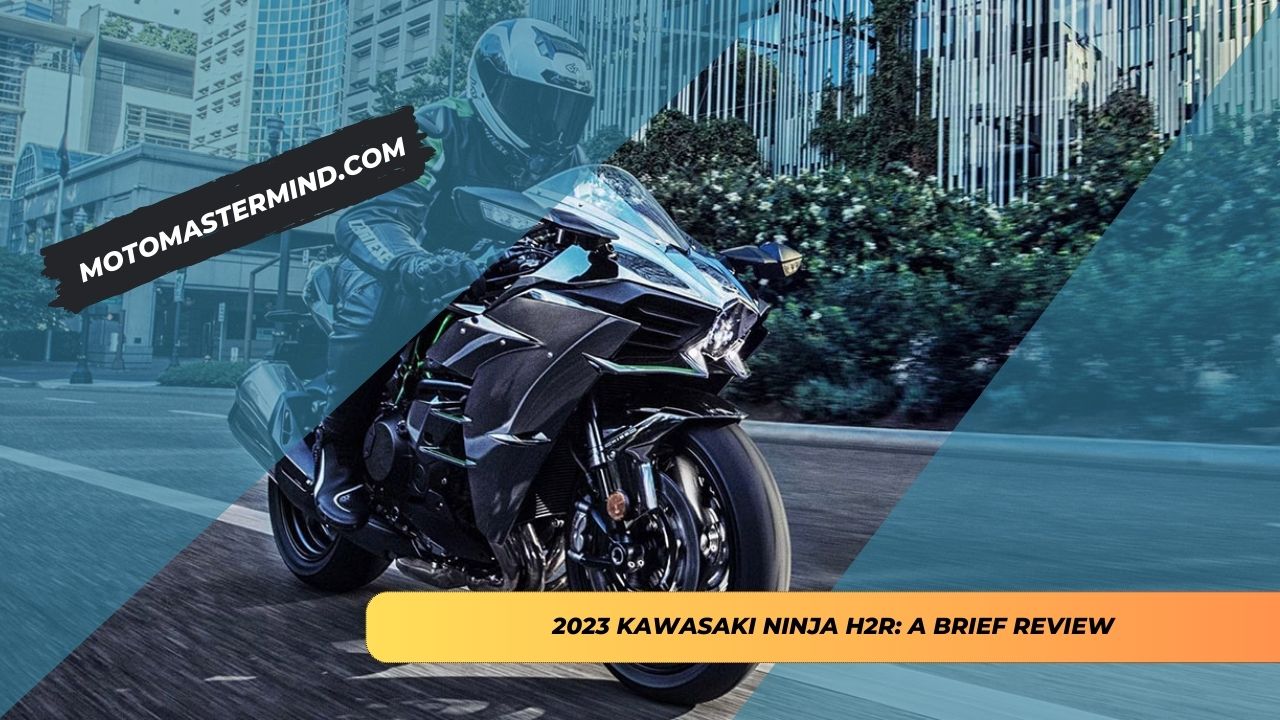
Remarkable Speed Metrics
The 2023 Ninja H2R proudly parades one of its most lauded features – astonishing top speed. This exemplar of hyper sport motorcycles can attain speeds escalating to 240 mph, solidifying its stature as one of the speediest production motorcycles ever conceptualized.
Power Delivery and User Safety
Yet, riders experience an encompassing sense of security as the formidable power is dispensed in a refined and foreseeable manner. This is credited to Kawasaki’s superior electronics and adept engine control systems. Riders acclaim the engine’s willingness and ability to proffer astonishing power across the entire RPM spectrum, elevating the riding experience to an exhilarating level.
Advanced Technological Integration
Beyond its astounding speed capabilities, the technological advancements and standard incorporations of the 2023 Ninja H2R have garnered the admiration of numerous motorcyclists. Integrated electronic aids like the proficient Kawasaki traction control system, launch control mode, and diverse aggressive sport riding modes enhance the riding experience. The superior suspension and braking apparatus also deliver unmatched performance and manipulation capabilities.
Aerodynamic Styling and Design
- Innovative Carbon Fiber Devices: Its design is further accentuated by carbon fiber aerodynamic implements, which confer a sleek and streamlined appearance and surpass their traditional counterparts in weight efficiency. Even with its track-oriented design, it has been noted that the 2023 Ninja H2R maintains an unexpected level of riding comfort.
- Ergonomic Comfort: The well-cushioned and ergonomically fashioned seat ensures riders enjoy stable and comfortable positioning. Adjustable components like footpegs and handlebars empower motorcyclists to modify the motorcycle’s ergonomics to their liking, enhancing the overall agility and responsiveness of the bike due to the resultant weight reduction.
Fuel Efficiency and Riding Prerequisites
However, fuel efficiency may be different from the strong suit of the 2023 Ninja H2R. It averages around 35 mpg in fuel consumption, a reasonable compromise given its high-performance engine demands. Additionally, its substantial body becomes more evident during sharp maneuvers, rendering it a less suitable option for novice riders.
Investment Considerations
Pricing Implications Another point of contention arises with the motorcycle’s premium pricing. While the high-octane performance of the H2R rationalizes its excellent cost, it remains a substantial investment, potentially constraining its accessibility to a broader spectrum of enthusiasts.
Final Thoughts on the 2023 Kawasaki Ninja H2R Review
The 2023 Kawasaki Ninja H2R, with its blend of exceptional speed, advanced technology, and design innovations, positions itself as a motorcycle of unparalleled caliber. However, considerations regarding its premium pricing, fuel efficiency, and substantial build need to be evaluated by potential acquirers. It remains a symbol of high-performance mastery and meticulous craftsmanship in hypersport motorcycles.

